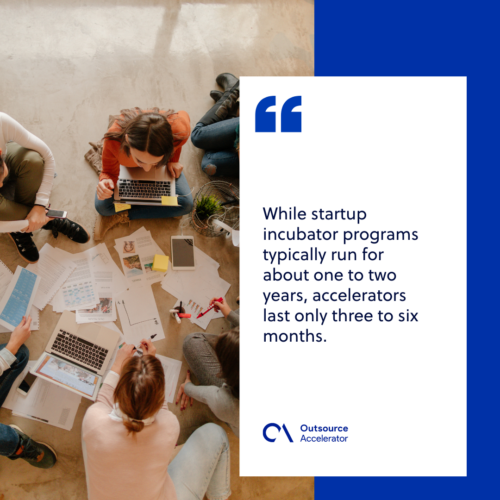Startup incubator
Definition
What is a startup incubator?
A startup incubator is a program that caters to startup businesses or companies and helps them grow. Non-profit organizations, such as universities, often run these programs.
However, there are also other incubators formed by civic groups, government units, successful entrepreneurs, and startup organizations.
While the media often focuses on incubator programs in the tech industry, there are incubator programs for startups in other sectors. In fact, incubator programs often have foci that vary per region.
For example, New York City, which harbors various restaurants and fashion brands, is also home to many incubators that cater to both the food and fashion industries.
There are also incubator programs that accept all kinds of startups and don’t discriminate based on industry.

What does a startup incubator offer?
Joining a startup incubator program is highly beneficial to startups. The program comes with many advantages that significantly boost a startup’s chances of success.
Besides providing a working space with the necessary equipment, there are other perks as well:
- Access to mentoring sessions with successful entrepreneurs.
- Opportunities to build a network with established business owners and other startup ventures.
- Access to business and legal advice.
- Access to potential investors.
Startup incubator vs. startup accelerator
Startup incubators share some similarities with startup accelerators. However, the two programs have key differences in certain aspects:
- Program timeframe. Startup incubators typically develop investments over a more extended period. These “incubation” periods often last about one to two years. On the other hand, accelerator programs generally last only a few months.
- Venture stage. Startup incubators primarily select startups still in the product-development phase and have yet to develop a business model. Meanwhile, accelerators focus on existing companies with at least some degree of establishment and a minimum viable product (MVP).
- Seed funding. Incubators very rarely grant seed funding to business ventures. With accelerators, this is the standard practice – providing capital investments in exchange for a percentage of equity.
Startup incubator or startup accelerator: Which is better for startups?
Much of the benefits gained from joining a startup incubator program are similar to those in accelerator programs. However, some startups are more compatible with one than the other.
To know whether you should apply to a startup incubator or an accelerator program, consider the following:
- Your product. Incubators are more suited for startups that are yet to produce an MVP and a working business model. On the other hand, accelerators are apt for more established startups ready for scaling.
- Your funding needs. As mentioned earlier, incubators seldom provide capital investments to startups. As such, applying to an accelerator program would be a better choice for businesses that need funding for scaling.
- Your startup’s timeline. Incubators provide support for longer periods compared to accelerators. While startup incubator programs typically run for about one to two years, accelerators last only three to six months.

List of startup incubator programs worldwide
For startup ventures considering applying to startup incubator programs, below is a list of the top incubator programs worldwide.
- Advanced Technology Development Center (Georgia, USA)
- AI Startup Incubator (Prague, Czech Republic)
- Carbon Incubator (Bucharest, Romania)
- EvoNexus Incubators in (California, USA)
- H2 Ventures (Sydney, Australia)
- JAFCO Japan (Tokyo, Japan)
- LaunchVic (Melbourne, Australia)
- PS27 Ventures (Florida, USA)
- Venture Catalysts (Maharashtra, India)
- X21 Digital (Singapore, Singapore)







 Independent
Independent




